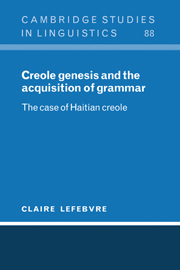Book contents
- Frontmatter
- Contents
- Tables
- Preface
- Abbreviations
- 1 The problem of creole genesis and linguistic theory
- 2 Cognitive processes involved in creole genesis
- 3 The research methodology
- 4 Functional category lexical entries involved in nominal structure
- 5 The preverbal markers encoding relative Tense, Mood and Aspect
- 6 Pronouns
- 7 Functional category lexical entries involved in the structure of the clause
- 8 The determiner and the structure of the clause
- 9 The syntactic properties of verbs
- 10 Are derivational affixes relexified?
- 11 The concatenation of words into compounds
- 12 Parameters
- 13 Evaluation of the hypothesis
- 14 Theoretical consequences
- Appendices
- Notes
- References
- Index of authors
- Index of languages and language families
- Index of subjects
5 - The preverbal markers encoding relative Tense, Mood and Aspect
Published online by Cambridge University Press: 23 November 2009
- Frontmatter
- Contents
- Tables
- Preface
- Abbreviations
- 1 The problem of creole genesis and linguistic theory
- 2 Cognitive processes involved in creole genesis
- 3 The research methodology
- 4 Functional category lexical entries involved in nominal structure
- 5 The preverbal markers encoding relative Tense, Mood and Aspect
- 6 Pronouns
- 7 Functional category lexical entries involved in the structure of the clause
- 8 The determiner and the structure of the clause
- 9 The syntactic properties of verbs
- 10 Are derivational affixes relexified?
- 11 The concatenation of words into compounds
- 12 Parameters
- 13 Evaluation of the hypothesis
- 14 Theoretical consequences
- Appendices
- Notes
- References
- Index of authors
- Index of languages and language families
- Index of subjects
Summary
Ever since the famous paper by Bickerton (1984) on the Language Bioprogram Hypothesis, the Tense, Mood and Aspect systems (henceforth the tma systems) of creole languages have been a target for competing theories of creole genesis. This chapter examines the origin of the Haitian tma system within the framework of the relexification hypothesis. First, it is shown that the general features of the Haitian tma system pattern on the model of Fongbe rather than French. It is then argued that, while most of the semantic and syntactic properties of the lexical items involved in the tma system of Haitian are derived from the corresponding lexical entries in the substratum language, the phonological representations of these markers appear to be derived from the phonetic representations of French periphrastic, and thus lexical, expressions. Section 5.3 discusses the temporal interpretation of bare sentences. The chapter ends with a discussion of dialect levelling. The data and analysis presented in this chapter rely heavily on an extensive and detailed comparative study of the Haitian, French and Fongbe tma systems by Lefebvre (1996b).
Overview of the tma systems of Haitian, French and Fongbe
In Haitian creole, the verb in a tensed clause is invariant; it always occurs in its simple form. In French, however, the verb in a tensed clause obligatorily bears inflectional morphology. Tense, mood and aspect are encoded by means of inflectional affixes on the verb. In the following examples, the different endings on the verb distinguish between simple past, present and future tense, respectively: j'aimai ‘I loved’, j'aime ‘I love’, j'aimerai ‘I will love’.
- Type
- Chapter
- Information
- Creole Genesis and the Acquisition of GrammarThe Case of Haitian Creole, pp. 111 - 140Publisher: Cambridge University PressPrint publication year: 1999



